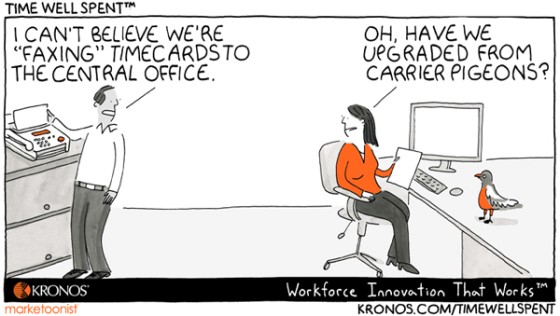(Editor’s Note: Today’s article is brought to you by our friends at Kronos, a leading provider of workforce management and human capital management cloud solutions. This week, Kronos ranked on Glassdoor’s annual listing of the Top 100 Best Places to Work in the U.S. as a top employer in the software industry. While this is the first time Kronos has cracked Glassdoor’s Top 100 Best Places to Work list, CEO Aron Ain has twice been named a Glassdoor Highest Rated CEO. Congrats to them! Enjoy the article.)
There has been much conversation about the digital divide – the widening gap between those who have technology (specifically the internet) and those who do not. The activities and access we have simply because we have internet is mind boggling.
As such, it might seem obvious that the ability to successfully use technology is important. Possibly even something we take for granted. For example, how many times do we assume that someone knows how to use the Microsoft Office Suite. According to this 2016 article, eighty-five (85%) of the Fortune 100 uses Microsoft Office. That’s a lot, but it’s not everyone.
Which brings me to today’s Time Well Spent from our friends at Kronos. I couldn’t help but laugh at the “fax” reference. Personally, I don’t remember the last time I faxed anything. But for some businesses, faxing is still an important way to send information. However, if your organization is in the “faxing” camp, let me toss out a couple of thoughts to consider:
The kind of technology your organization uses says a lot about your company. If your business is using old hardware and software, candidates might assume that your company is behind the times. Is that the message that you want to send?
If technology does help employees work faster and smarter, does a lack of current technology send a message about the company’s view on employee development? What I mean by this is … could workplaces that drag their feet on giving employees tech be perceived as not caring about employee morale and wellbeing? Why make employees do double or triple the work if a technology solution can help produce results faster?
Organizations that aren’t willing to test and try new technologies could be viewed as resistant to change. This isn’t to say that companies need to be early adopters of every new shiny technology on the market. But companies that aren’t willing to explore could be seen as dinosaurs.
I’m not saying a business that doesn’t have the latest and greatest technology is doomed. But I do think it could make sense for organizations to ask themselves if technology is keeping them from attracting, engaging, and retaining the best talent. Something to think about.
13








Alex says
Today’s world are depending on Technology day by day. But is It true that the business is running well which is using the latest technology?